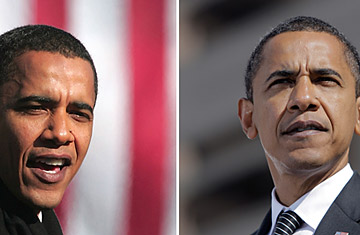
Left to Right: Barack Obama announces his run for the presidency in February of 2007 ; Barack Obama at a campaign rally this week..
Almost two years ago, in the first months of Barack Obama's campaign for the presidency, whenever the Illinois senator would get crowds going he would intentionally dial it down a notch. I remember seeing him in Columbia on his first trip to South Carolina in February 2007, six days after announcing his candidacy. When the crowd started chanting, "Yes, we can," to his riff on Civil Rights, Obama abruptly changed the subject to labor's right to organize. It was clear he was making a conscious effort not to be perceived (or pigeonholed) as the same inspirational speaker they saw at the 2004 convention; he wanted to introduce himself and tell his story, but most of all he wanted people to realize that there was substance underneath all the style. Indeed, what he wanted was the reaction he often ended up getting from many who came to see him on the stump during the primaries: "He wasn't what I expected."
Of course, the Obama campaign will be remembered for spectacles like Obama's stadium speech at the Democratic convention and his equally massive appearance in Berlin. But in fact, his campaign just as often deliberately chose not to maximize Obama's crowd appeal. During the primaries, where retail politics was premium, they focused on house parties and ice cream socials, concerned that Obama's celebrity status might put off the famously demanding Iowa and New Hampshire voters. In the general election they centered his appearances on town hall meetings and round table discussions, usually with folks who had stories to tell about the economy. (See pictures of Barack Obama backstage at the Democratic National Convention.)
In this 20-month long campaign I have seldom seen Obama bring the full power of his oratory to the biggest possible crowd his campaign can build. That is, until this week. As the long campaign nears the end, the campaign has stopped shying away from such huge audiences, and the crowds have been stunning: 100,000 in St. Louis, 75,000 in Kansas City, 100,000 in Denver, 45,000 in Fort Collins, Colorado, 50,000 in Albuquerque. "We want to see and touch and talk to as many people as possible," says David Axelrod, Obama's top strategist. "This is momentum time." And for anyone who was disappointed by Obama's wonky convention speech, his closing argument is all gravy — all the inspirational lines that get people on their feet and cheering their hearts out. (See pictures of Barack Obama on the campaign trail.)
"America, the time for change has come," Obama told a roaring crowd of 20,000 in Sunrise, Florida, on Wednesday, the same day that millions of viewers watched him live as part of a 30-minute infomercial the campaign bought on NBC, CBS, Fox, BET, MSNBC and TV One. "In six days, we can choose hope over fear, unity over division, the promise of change over the power of the status quo. In six days, we can come together as one nation, and one people, and once more choose our better history."
His rhetoric is as soaring as it was at the 2004 Democratic National Convention, but voters shouldn't be fooled — Obama is far from the same man he was four years ago, or even 21 months ago, for that matter. There are the subtle physical changes: the graying hair, the pounds shred from months of grueling 18-hour days. And then there's the legacy of the longest campaign in U.S. history: a stronger debate voice, a flag pin on his lapel and a tendency, picked up from Hillary Clinton, to relay some of the stories he's heard from struggling Americans. Thanks to John McCain and Sarah Palin, he's refined the art of attacking an opponent by flinging their own words back at them. "Look — we've tried it John McCain's way. We've tried it George Bush's way. Deep down, Senator McCain knows that, which is why his campaign said that 'if we keep talking about the economy, we're going to lose,'" Obama said. "That's why he's spending these last weeks calling me every name in the book. Because that's how you play the game in Washington."
But Obama's closing argument is still marked by his trademark reserve. As the crowds around him chant and cheer and pump their fists, Obama remains steadier than ever before. While he's always been calm, he has, over the last 20 months, acquired a self-assuredness, a confidence that he lacked during that long summer in 2007 when Hillary Clinton appeared to be the inevitable nominee and his speeches fell flat. This may feel like a Hollywood finish, but if Obama wins, he will very quickly come down to earth: America will return to the sobering reality of an economic crisis and wars on two fronts. His words will still matter, especially in an Inauguration or State of the Union speech, but his legacy from then on will be shaped much more by what he does sitting alone in the Oval Office, when none of his adoring fans are watching.
